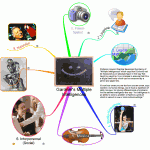Gardner’s Theory of Multiple Intelligence Activities for Kids
 There were times when parents were satisfied with just the performance of the child in school. If he did well in the examination he was considered to be intelligent. About twenty five years back theory of multiple intelligence was developed. According to this theory the traditional way of judging the intelligence of the child based on his I.Q. test is very limited. According to the new theories there are eight intelligences in a child, and judgement has to be made on the basis of these. These are:
There were times when parents were satisfied with just the performance of the child in school. If he did well in the examination he was considered to be intelligent. About twenty five years back theory of multiple intelligence was developed. According to this theory the traditional way of judging the intelligence of the child based on his I.Q. test is very limited. According to the new theories there are eight intelligences in a child, and judgement has to be made on the basis of these. These are:
- Linguistic intelligence
- Mathematical intelligence
- Spatial intelligence
- Bodily intelligence
- Musical intelligence
- Interpersonal intelligence
- Intrapersonal intelligence
- Naturalist intelligence.
In schools, generally intelligence of a child is judged from the first two factors listed above, namely linguistic and mathematical. According to Dr. Howard Gardner, profounder of the theory, other six intelligences are also important to judge overall level of intelligence of any child. Many children who are not good in the first two listed above and may be excellent in others namely music, arts and logics etc. do not receive proper reinforcement from their schools and such kids are often labelled with attention deficit disorder.
This theory requires a major change in the way our schools function. Instead of concentrating only on maths and language, they need to concentrate on music, cooperative learning, art, craft, field trips and interaction with friends and non friends or people not known to the child. This has attracted the administration of a number of schools and they have started concentrating equally on extracurricular activities to enable all round development of the child.
The remarkable feature of this theory is that it applies to all levels of education whether you may be in kindergarten or middle school or high school or in college. This theory applies equally to teachers and students. Students may be children or adults.
You don’t have to learn a particular topic in eight ways, you have to study the possibilities and decide which possibility is of most interest to you or a more effective learning tool. This tool of learning is so designed that it expands our scope of learning in the manner best liked or found suitable by us. When attempting to teach something new, see how a child imbibes what you want to teach him. You could enhance learning with music or pictures. Some children will learn better when words are associated with something else.
Besides what is required for good grades in school, a child can be good in or score highly on a scale when judged on the other criteria of intelligence. He should be given credit for that and encouraged to grow and excel in that field. These fields can be more than one and defy conventional pairing e.g. a child may be good at maths and music. For all round development of the next generation, education with an open mind is necessary.